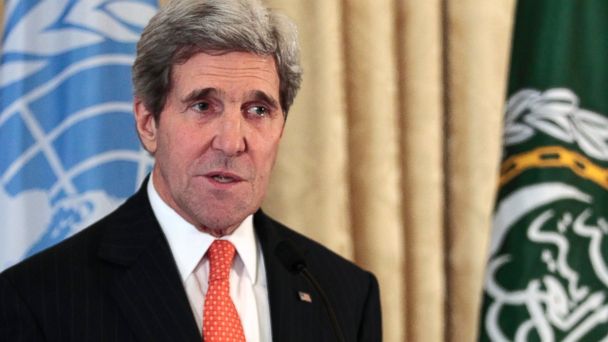US-Israeli Relations Strained by 'Messianic Fervor'

Secretary of State John Kerry speaks during a press conference, Jan. 13, 2014, in Paris. Image credit: Chesnot/Getty Images
U.S.-Israeli relations have at times been rocky since early in President Obama's first term, but the relationship may have hit a new low today - publicly, at least - with two spats brewing in the Israeli press.
Two conservative, high-ranking Israeli officials criticized Secretary of State John Kerry today, one of them - Israel's defense minister - accusing Kerry of "messianic fervor."
Kerry has made Jerusalem and Ramallah his second homes this fall and winter, pushing (myopically, some have said) for an elusive, long-sought peace deal that would create a Palestinian state and end decades of off-and-on conflict.
The secretary of state has visited Israel five times since September, shuttling back and forth between meetings with Israeli Prime Minister Benjamin Netanyahu and Palestinian President Mahmoud Abbas. On a nine-month timetable agreed to on July 30, Kerry is pushing for a framework agreement on a final peace deal by the end of April, an ambitious goal, by any standards.
But a top Israeli official just wants Kerry to leave Israel alone, according to comments published in Israeli newspaper Yedioth Ahronoth, which reported today that Defense Minister Moshe Ya'alon called Kerry "obsess[ed]" with Israeli/Palestinian peace:
"Abu Mazen (Palestinian President Mahmoud Abbas) is alive and well thanks to us," Ya'alon said. "The moment we leave Judea and Samaria (the West Bank) he is finished. In reality, there have been no negotiations between us and the Palestinians for all these months - but rather between us and the Americans. The only thing that can 'save us' is for John Kerry to win a Nobel Prize and leave us in peace."
…
"The American security plan presented to us is not worth the paper it's written on," Ya'alon said. "It contains no peace and no security. Only our continued presence in Judea and Samaria and the River Jordan will endure that Ben-Gurion Airport and Netanya don't become targets for rockets from every direction. American Secretary of State John Kerry, who turned up here determined and acting out of misplaced obsession and messianic fervor, cannot teach me anything about the conflict with the Palestinians."
In early December, Kerry brought Gen. John Allen, the U.S. security envoy for peace negotiations, and presented some proposals on Israeli security under an agreement, the proposal Ya'alon referred to as worthless.
The State Department has called the comments "inappropriate" and "offensive." Spokeswoman Jen Psaki told reporters:
"The remarks of the Defense Minister if accurate are offensive and inappropriate especially given all that the United States is doing to support Israel's security needs.
Secretary Kerry and his team including General Allen have been working day and night to try to promote a secure peace for Israel because of the Secretary's deep concern for Israel's future. To question his motives and distort his proposals is not something we would expect from the Defense Minister of a close ally."
Ya'alon is a member of the Likud Party, from which Netanyahu hails, and which has opposed a two-state solution along 1967 borders, the starting point the United States has outlined in working towards a peace agreement.
But that's not Kerry's only dispute playing out in the Israeli media today.
Israeli housing minister Uri Ariel, a member of the conservative-nationalist Jewish Home party, contradicted the State Department's public claims about new Israeli settlements, reportedly telling a radio station that Kerry has approved of the announcements of new housing units and that Israel will continue to build them regardless of what the United States says.
From Israeli media network Arutz Sheva:
Speaking to Kol Yisrael radio, Ariel said that the publication of the latest tenders for new homes were coordinated with U.S. Secretary of State John Kerry and that he approved of them.
"Even if the United States does not approve of the construction, it will continue," he added. "The United States is our greatest ally, but they also sometimes take actions we do not approve of."
Settlement plans have nearly derailed talks. After Israel announced plans to build 3,500 new settler homes in parts of the West Bank, the Palestinian negotiating team resigned in November.
Ariel's reported remarks contradict what the State Dept. has said: that the U.S. does not coordinate or condone Israeli announcements of new settlement plans. The State Dept. has called new settlements "illegitimate"; when asked for details of Kerry's conversations with Netanyahu about them, the State Dept. has pointed back to public comments and reiterated U.S. opposition.
A senior U.S. official disputed Ariel's assertion, telling reporters:
"Our position on settlements has not changed, and we have consistently communicated our objection both publicly and directly to the Israelis on settlement announcements. We have also not coordinated or agreed to any settlement announcements.
In addition, Secretary Kerry has never met or spoken to Uri Ariel, so nothing has been coordinated or agreed with him, and he is not in a position to describe the Secretary's conversations with Prime Minister Netanyahu."
In such a high-stakes negotiation, ranklings can be expected on both sides, and the Israelis' comments follow what one might expect - conservatives in Israel opposing the proposals Kerry is working toward-but it is rare, in the caste of Ya'alom especially, that such aggressive criticism is publicly aired.